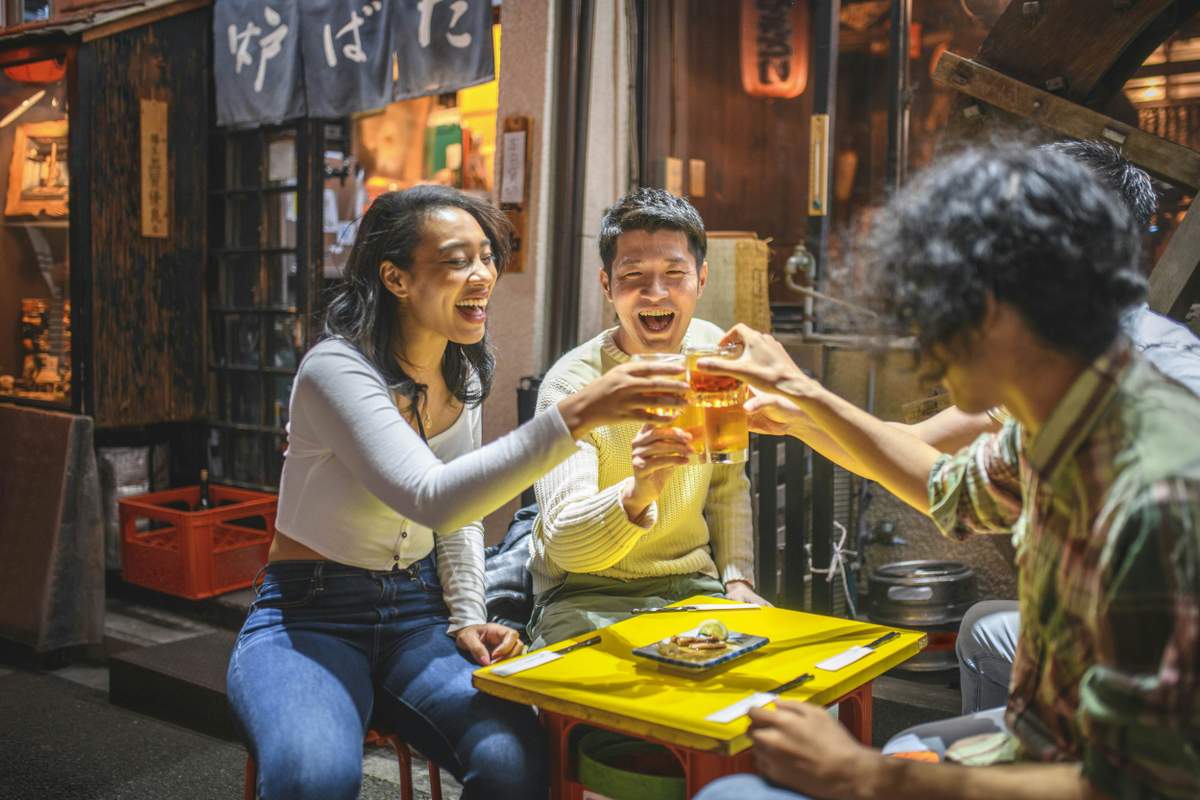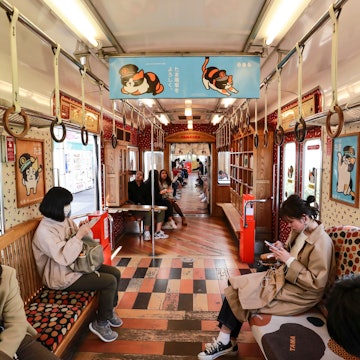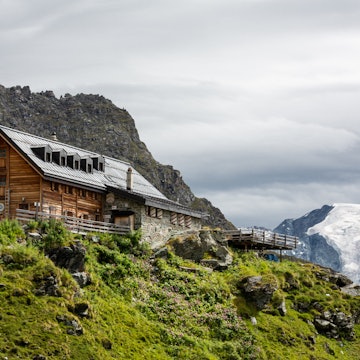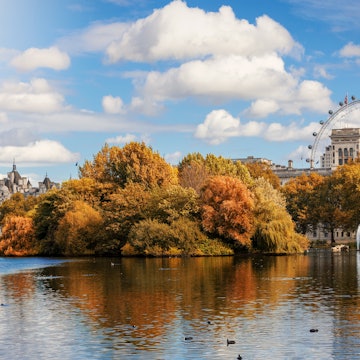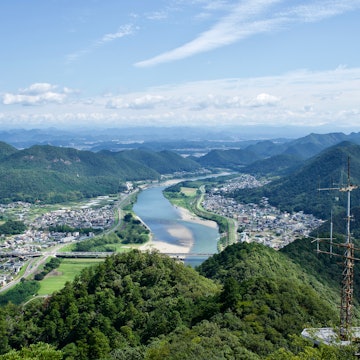

Flying carp streamers to mark Children's Day at the end of Golden Week in Japan. LilyRosePhotos/Shutterstock
For residents of Japan, Golden Week is one of the most anticipated periods in the Japanese calendar: a shining beacon of family time, overnight trips and vacationing. It is the one week of the year when the majority of Japan enjoys a generous amount of vacation days.
If your Japan visit coincides with Golden Week, you might be baulking at the perceived busyness of the country during this time. And it’s true, it can be busy and stressful, but if you plan ahead, it’s a pretty special time to visit.
When is Golden Week?
Despite its name, Golden Week doesn’t mean one whole week of time off. Instead, it’s the name for the period of four allocated public holidays. It starts at Shōwa Day on April 29, then hits Constitution Memorial Day (May 3) and Greenery Day (May 4), before finishing on May 5 with Children’s Day.
As the majority of these dates are merely formal observances, there is no set way to behave, or (for the majority of the days) particular foods that everyone eats. For Greenery Day, for instance, it’s recommended to visit parks and appreciate nature, although this is really up to each individual. Children’s Day tends to see more uptake, with families hanging koinobori (flying carp streamers) from their windows, which can be fun to spot as you’re traveling around.
Golden Week is one of the busiest times of the year for domestic travel, as workers rush to enjoy their rare, long time off to the max. Overseas travel is popular, as are trips to Disneyland, USJ (Universal Studios Japan) and similar attractions.

Weather during Golden Week
In terms of weather and temperature, Golden Week falls during the gorgeous space of mid-spring, making it a near-perfect time to travel. It’s just a little too early for the mosquitoes to be out, and the chill of winter dissipated over a month prior. In areas such as Tokyo and Kyoto, short sleeves are okay during the daytime, and a thin jacket should suffice in the evening.
What are the pros and cons of visiting during Golden Week?
Traveling to Japan during Golden Week comes with its cons, but there are a couple of surprising advantages too. The cons: it's expensive, it's busy, and there are many closed amenities.
Busy: A significant amount of Japan wants to travel out of the cities during Golden Week. The Japanese workstyle can be incredibly taxing – there’s a reason that the language has a word meaning “death by overwork” – so many city-dwellers head straight out of the city when they get the chance. Trains, roads and buses will all be packed with people, and it may be hard to obtain a ticket for transportation, such as the bullet train and buses, without planning several months in advance.
Surge pricing: The entirety of the Japanese population is aware of the rare holiday season, so of course prices are hiked up to meet the demand. According to Japanese media, Nikkei, around 75% of hotels raise their prices by at least 10% during this period.
Closed amenities: Places such as smaller, family-run or one-person businesses may close for the duration, as owners go out of town. Administrative businesses, such as banks and post offices, and many doctors and dentists are likely to be closed too.

Now for the pros: spacious Tokyo, relaxed people and incredible weather.
Spacious cities: The day population of Tokyo swells to an astronomical 15 million from 13.5 million, an increase of around 10%. But during Golden Week, it’s safe to assume that the majority of the people traveling into the city are on vacation. There are no white-collar workers lining up round the block for bowls of ramen, and rush hour is basically nonexistent.
Relaxed residents: Speaking from experience, city residents who’ve consciously chosen to remain are enjoying a city that is less busy than normal. People will be out picnicking in parks, visiting museums and drinking at local spots, looking forward to a lie-in the next day. As a traveler, if you head to a local bar, you may well find that the locals are even friendlier than normal.
Weather: The weather in Japan is fantastic, hitting the spot between not-too-hot and not-too-cold.
Is it easy to get in and around during Golden Week?
Traveling to Japan from abroad at the start of Golden Week shouldn’t be too stressful. Whether it’s one of the Tokyo airports (Haneda and Narita) or further afield, the main traffic will be going in the opposite direction, out of the country. Likewise, leaving Japan at the end of Golden Week (from May 4 onwards) will be easy, but don’t expect the fares to be cheaper. Vice versa, if you’re traveling into Japan at the end of Golden Week, or out of Japan at the start of the period, be prepared for long waits at all stages of the process.
It’s worth noting that the regular airport shuttle buses to Haneda Airport from Tokyo are often very busy at all times of the year, so if you plan on getting the bus, make sure to leave plenty of time. It’s also a good idea to ask your hotel if it can arrange transportation.

Domestic travel
For travel within Japan, trains, planes and buses are all viable options, although we’d strongly recommend booking in advance for whichever method you take.
If you’re dying to ride on the famous Japanese bullet trains (shinkansen), book tickets for Golden Week at least a month before, as you won’t be able to board without one. Aside from the shinkansen, be sure to have a look at the limited express trains and local trains too. Personally, I prefer limited express trains, as they are a fraction of the cost of the shinkansen. Upgrade to the “green car” for a plush seat and table.
For those on a tight budget, the overnight bus is another option. They are even cheaper than the trains and can be very comfortable, but you’ll need to book far in advance for Golden Week.
Top things to do during Golden Week
Flying to popular domestic tourist destinations like Okinawa and Hokkaidō might be a tad stressful in terms of sheer numbers of travelers, but visiting lesser-traveled places like the prefectures of Kōchi, Fukui and Aomori is a good bet.
Explore Tokyo’s underground drainage system
Taking a tour around Tokyo’s storm drains is an unlikely crowd pleaser. You’ll be shown around its cavernous, romanesque depths, and guided through its operating rooms. The tours are bookable one month in advance, and in Japanese only, so make sure you attend with someone who understands.

Take a pilgrimage around the countryside
Japan has several pilgrimages that take walkers on a course around the countryside, through towns, villages and even cities. To take the pilgrimages, you don’t need to be religious, and routes such as the Kumano Kodo pilgrimage take walkers (or even drivers!) through mountains and teahouses. You can wear special pilgrim clothes and it’s a great way to meet locals, many of whom will have walked it themselves.
Check out some unique Japanese music
Golden Week’s bumper holiday package means that everyone is keen to let their hair down midweek. Whether you’re into vocaloid music with its underground idols, indie bands or soft jazz, you’ll find something to enjoy, or at least be bewildered at. I’ll never forget the time I walked into Forestlimit, a tiny club in Hatagaya, and was greeted with an artist writhing around on the floor wearing a suit made out of lasers. All in the name of art, of course. Kōenji in Tokyo is well-known for its underground music scene.
Discover some countryside art
From the Setouchi Triennale on the islands around the Seto Inland Sea, to the Kirishima Open Air Museum in Kagoshima and Kiyoharu Art Colony in Yamanashi, Japan boasts a significant amount of art museums and festivals in far-out areas. For good reason, too: there’s more space to enjoy the exhibits and installations.

My favorite thing to do during Golden Week
As a Tokyo-ite who travels a helluva lot, during Golden Week you’ll find me doing the opposite: staying in Tokyo and exploring some nearby neighborhoods. The city is one of the largest metropolises in the world, so no matter how long you spend here, you’ll never cover it all. I keep a list of notable shōtengai (market streets), and when it comes to Golden Week, I’ll often spend some time in a couple of those.
Shōtengai have fun shops and a lot of small businesses, in contrast to large department stores. The shops tend to stay open through the holiday, too. Each shopping street is different – Musashi Koyama Palm, for instance, is the longest one in Tokyo, and has a great mix of old-fashioned and trendy shops. You’ll find great third wave coffee shops and old kissaten (coffee houses) on the same street. I’ll also do a search for nearby art galleries too, and pop in to see the latest exhibition.
How much money do I need during Golden Week?
Before we get into the calculation side of things, it’s worth mentioning that Japan loves cash. If you’re in a big city, then contactless methods, like credit cards, are accepted, but if you’re off to the countryside, we recommend bringing cash with you, too. You should be able to use your international card in 7-Eleven convenience stores, so be on the lookout!
Night at a capsule hotel: from ¥7000 Japanese yen (US$47)
One-day Tokyo train/metro combo pass (unlimited rides): ¥1600 (US$10.70)
Cafe morning set: ¥700 (US$4.68)
Tricolored dango (soft rice-flour balls): ¥300 (US$2)
Tempura lunch from an independent place: ¥1600 (US$10.70)
Fancy latte with your dog’s face on it: ¥1300 (US$8.69)
Monjayaki (savory pancake street food dish): ¥2000 (US$13.53)
Ticket to live show in a local venue: ¥3000 (US$20)

How do I avoid the crowds?
Some tips for staying calm and away from the crowds during the period:
Head to a lesser-traveled area. Gifu prefecture, Nagano prefecture, and Tōhoku are all criminally under-traveled, and especially around Golden Week.
Spend time in local areas, away from the main tourist spots. Check out the last stop on your nearby train line.
Search “hidden spot” in Japanese (穴場) on your preferred map app.
What’s closed during Golden Week?
It’s important to be aware of the types of businesses that are often closed during Golden Week. Businesses that fall into the “administrative” category will likely be closed, such as banks, post office and city halls. Many doctors' practices and dentists will be shuttered, too.
Small businesses will also probably be shut, so make sure to call ahead if you’re planning to make a special trip somewhere.
What’s open through Golden Week?
Large chains and restaurants will be open during Golden Week, as will many of the facilities in designated tourist spots. Museums and art galleries will often have extended opening hours, although they are likely to be busy.






